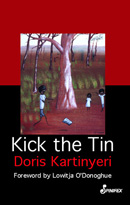
KICK THE TIN
Reviewed by Charlotte Simpson
Doris Kartinyeri is a member of the Stolen Generation; in 1945 she was taken from her family by the Australian authorities when she was less than a month old, and only days after her mother's death. She grew up in Colebrook Home, run by the United Aborigines Mission, with several hundred other Aboriginal children who had been similarly removed and who were allowed little contact with their families. While her early life at the school was filled with fun and love for the two women who ran the establishment, a change of staff led to a sharp deterioration in the way that the children were treated by the white Christians who were in charge. During this time Kartinyeri was abused by both male and female staff members. After leaving the school in her early teens, she drifted unhappily through adult life, experiencing further abuse at the hands of a preacher, and spending time in and out of hospital because of problems caused by her bipolar disorder.
It's easy to expect that Doris Kartinyeri's story would be another misery memoir, one of those books that feels like a prolonged therapy session in which the writer provides very detailed accounts of her horrifying experiences. However, the author writes with a quiet dignity about her life, not shying away from discussing the abuse she was subjected to, but not making this the voyeuristic centre of the her story.
Kartinyeri doesn't descend into diatribes about the injustices she suffered, which she would be perfectly justified in doing, but her anger and bewilderment comes through loud and clear. Her book is written in a conversational style that feels like she is in the room telling you her story. Kartinyeri asks questions that drive right to the heart of the matter about the system that carried out the forced removal of thousands of children, and she explains the devastating legacy of this experience in Aboriginal society today.
It is clear that at the age of sixty-four, Doris Kartinyeri is still coming to terms not just
with being physically stolen, but also with her resulting loss of family, culture, security,
and mental well-being. Kick the Tin is a quiet, powerful book.

Spinifex, paperback, 9781875559954